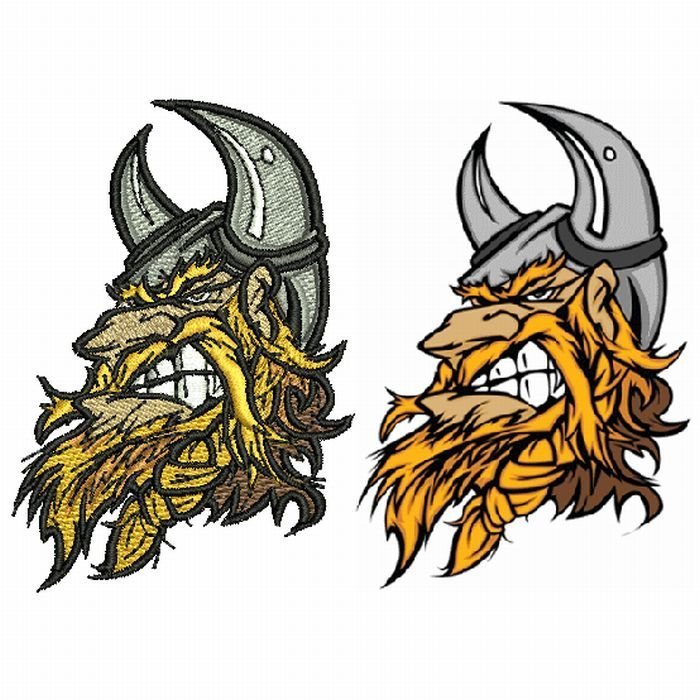High-grade Digitizing for Embroidery: Specialist Workmanship
High-grade Digitizing for Embroidery: Specialist Workmanship
Blog Article
Discover Various Kinds of Needlework Digitizing Strategies
Needlework digitizing has actually evolved significantly over the years, offering a myriad of techniques to bring layouts to life in the digital world. The world extends to extra advanced strategies like photorealistic embroidery digitizing and the fascinating realm of 3D embroidery digitizing.
Traditional Hand Needlework Digitizing
Conventional hand needlework digitizing entails the process of transforming intricate hand-stitched layouts into electronic styles for equipment needlework. This method requires proficient craftsmens to carefully examine the handcrafted style and then utilize specialized software program to recreate it in an electronic layout. Each stitch, color, and information should be carefully equated to ensure that the significance of the initial hand embroidery is protected in the digital version.
Among the essential challenges of traditional hand needlework digitizing is catching the complexities and subtleties of the handmade style. Digitizing for Embroidery. Craftsmens have to possess a deep understanding of different embroidery methods, such as satin stitch, chain stitch, and French knots, to precisely duplicate these strategies in the digital world. Additionally, they require to have an eager eye for information to ensure that the electronic design keeps the same level of artistry and workmanship as the initial hand-stitched item
Punching Method
To perfectly shift from standard hand needlework digitizing to the punching method, craftsmens should currently concentrate on transforming the elaborate digital styles into guidelines that embroidery equipments can translate. The punching technique includes using specialized software program to develop electronic documents that consist of commands for the needlework machine to follow. This process needs a deep understanding of not just the layout itself yet additionally the capacities and limitations of the needlework device.

Auto-Digitizing Software Program Programs
Needlework digitizing has actually been revolutionized by the advent of auto-digitizing software programs, offering artisans with advanced devices to transform digital designs into needlework device instructions successfully. Auto-digitizing software application programs utilize formulas to analyze digital photos or vector documents and produce needlework layouts automatically. These programs allow for quick and exact conversion of intricate designs right into stitch patterns, conserving effort and time for embroiderers.
Among the essential advantages of auto-digitizing software program is its straightforward interface, making it easily accessible to both newbies and seasoned digitizers. These programs frequently consist of features such as stitch editing devices, string shade matching, and the ability to sneak peek the last stitched layout. Additionally, auto-digitizing software application can manage intricate designs with several colors and detailed information, creating premium embroidery data appropriate for numerous page apparel and fabric projects.
While auto-digitizing software program supplies convenience and effectiveness, it is crucial for customers to recognize the restrictions of automated digitizing. Fine-tuning and manual modifications may still be needed to achieve the wanted needlework quality, specifically when dealing with elaborate or distinct styles. By leveraging the abilities of auto-digitizing software program alongside hand-operated digitizing methods, artisans can improve their embroidery digitizing process and develop stunning embroidered pieces.
Photorealistic Needlework Digitizing
Using sophisticated digital imaging methods, attaining photorealistic lead to needlework digitizing has come to be a sought-after skill amongst find more modern-day artisans. This strategy includes transforming high-resolution pictures into complex stitch patterns that carefully mimic the initial design, resulting in embroidery items that display realistic detail and deepness.
To achieve photorealistic needlework digitizing, craftsmens need to have an eager eye for information and a thorough understanding of just how various stitch kinds and thickness can affect the final end result. By thoroughly mapping out each shade and shade in the photo, embroiderers can create a digital file that overviews the needlework machine to duplicate the subtleties of the initial picture precisely.
Photorealistic needlework digitizing is specifically popular in producing custom layouts for apparel, home decoration, and art items where recording the significance of a photograph or art work is vital. This strategy allows craftsmens to transform memories, landscapes, pictures, and elaborate artwork right into spectacular stitched work of arts that showcase a mix of traditional craftsmanship and advanced modern technology.
3D Needlework Digitizing
With the advancement of digital Web Site imaging methods in attaining photorealistic lead to embroidery digitizing, the exploration of 'D Needlework Digitizing' uses a brand-new dimension to the complexities of design duplication. 'D Embroidery Digitizing' describes the three-dimensional digitizing technique that adds deepness and structure to needlework designs, producing a more practical and aesthetically appealing end product. This method utilizes software application that simulates the result of light and shadow on the needlework design, boosting its general aesthetic impact.
Among the vital benefits of 'D Needlework Digitizing' is its ability to make layouts look more natural and vibrant. By adding depth to the needlework layout, the final product shows up much more sensible and exciting (Digitizing for Embroidery). Furthermore, this strategy enables more innovative freedom in layout execution, making it possible for embroiderers to trying out different textures and results that were previously challenging to accomplish
Final Thought

Report this page